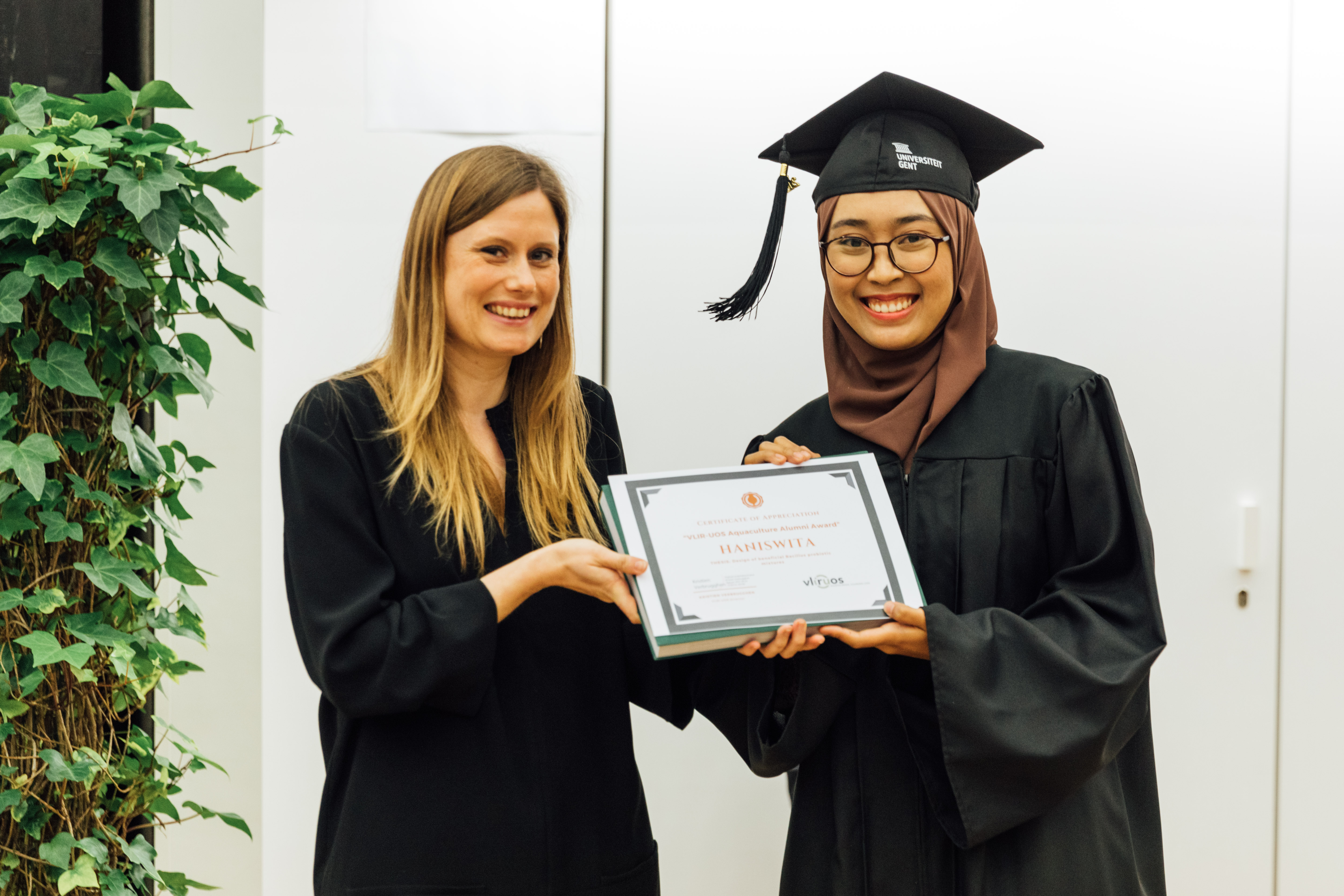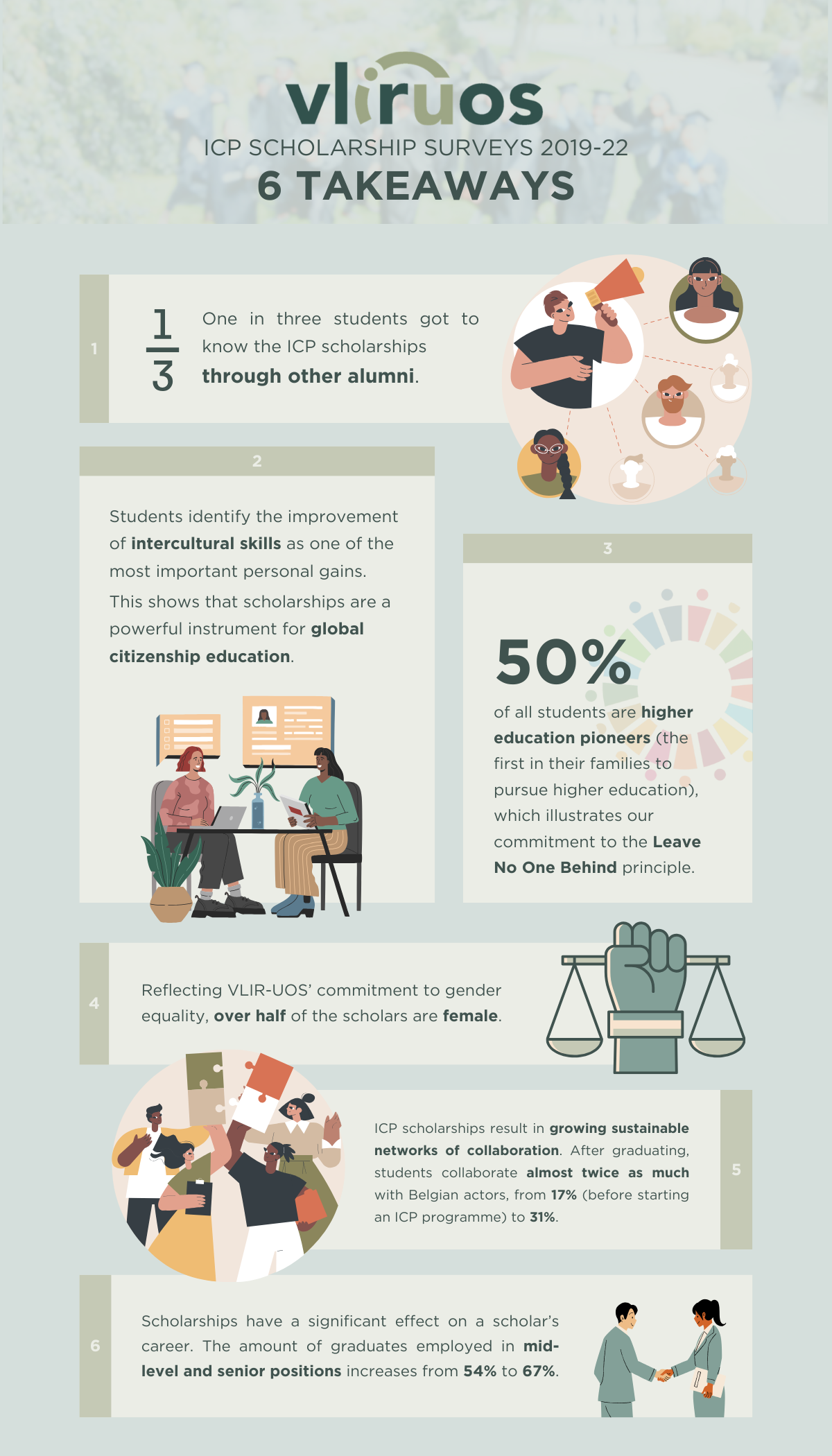Our website uses cookies to improve your experience. To make optimal use of this website please agree to our cookie policy.


VLIR-UOS provides an annual intake of 150 new first-year scholarships to applicants from 29 eligible countries in Africa, Asia and Latin America. The students can apply for 15 master programmes taught in English at one or more Flemish universities.
To know more about the selected students’ background, motivation, expectations, and career prospects, we ask them to fill out surveys. These take place both before the start of their programmes and 9 months after completion.
We compiled the completed pre-surveys (n = 622) and post-surveys (n = 228) that were filled out by students from 2019 up to 2022, to provide a snapshot of the early effects of our ICP scholarships. From this data we extracted six key takeaways.
We sat down for a brief interview about the surveys with Ise De Smet, our Mobility & Scholarships Coordinator.
Hey Ise, what is the objective of these surveys?
With the surveys, we would like to gain a better understanding of the impact of our scholarship programme. This is why we hold them both immediately before the students begin their studies and nine months after graduation.
Our surveys are meant to be complementary to the quality assurance mechanisms implemented by the educational programmes and the organising universities. We want to find out more about the students and how our funding is influencing them in terms of their career, networks, skills, etc. By analysing the data, we can pinpoint successful patterns as well as areas that require improvement.
What is exactly surveyed?
Just before they arrive in Flanders we ask scholars to share details regarding their motivation and expectations, their personal and professional background, and their network. After graduation, we ask them to reflect on these same questions and on how their study experience has influenced both their personal and professional development.
We are interested in several aspects, including but not limited to; what skills were developed during their international experience, the level of influence a scholar has on the organization that employs them after graduating, the activities in which they participate, and the relationship between these activities and the Sustainable Development Goals (SDGs).
The SDGs and Agenda 2030 seem to play a central role for VLIR-UOS, how do they connect to the ICP Connect scholarships?
It’s evident that receiving a scholarship to study abroad brings a lot of potential personal benefits. A student’s academic and personal horizons expand, they may receive a career boost, develop international professional networks, etc. There are also apparent benefits to the Flemish programmes. Scholarships can support them to integrate an international and intercultural dimension into the way they work.
However, our ambition extends beyond personal success and educational internationalisation. Through our scholarship programme we wish to contribute to the transformative goals of Agenda 2030, the action plan approved in 2015 by all member states of the UN, which encompasses the 17 SDGs. This means that we wish to encourage positive structural changes in institutions and societies. The aim is to support scholarship recipients to become change agents and enable them to take action once they return to their professional settings. This includes developing skills and knowledge, applying them in their respective fields, influencing organizational change, and thus contributing to broader societal change. The scholarship programme also aims to establish and help sustain social networks among scholarship holders, allowing for the exchange of experiences, insights, and prospective collaboration.
In line with this commitment to transformative change, we place a particular emphasis on the Leave No One Behind (LNOB) principle, which is a central component of Agenda 2030. This principle implies that we want to make sure that students from all backgrounds, including those who face socio-economic hurdles, have equitable access to educational opportunities abroad. It is worth noting that we welcome many higher education pioneers to the ICP programme: more than half of our students are the first in their family to pursue higher education.
To deepen our commitment, we have launched a social support fund called the LNOB fund. Its goal is to recompense scholars for sudden and unforeseen (financial) emergencies when no other financing sources can provide (adequate) assistance. These additional expenses relate to the scholar’s individual personal situation, such as pregnancy, psychological and health problems, emergencies, and so on.
What can we expect further from these surveys in the future?
We anticipate conducting more in-depth research on our data and working closely with the universities organizing the programmes. This can help to provide a more comprehensive understanding of our scholarships. Additionally, we are looking into the idea of personalising surveys for each ICP Connect project based on their own needs and goals.
A further ambition is to analyse the long-term impact of our programmes on graduates' lives and careers. We are excited to follow students in the years after graduation, tracing their journeys through alumni surveys.
On another front, VLIR-UOS has played an active role in harmonising the scholarship surveys with ARES (VLIR-UOS’s French-speaking counterpart) and the Institution of Tropical Medicine (ITM). This strategic harmonization aims to improve data consistency and comparability, paving the way for a joint publication about the profound impact our scholarship programmes have. We're optimistic that this collaboration between the three organizations will result in shared insights on international scholarships in Belgium, promoting a collaborative knowledge-sharing environment.
